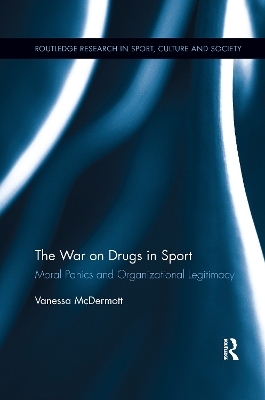
The War on Drugs in Sport
Moral Panics and Organizational Legitimacy
Seiten
2020
Routledge (Verlag)
978-0-367-59771-9 (ISBN)
Routledge (Verlag)
978-0-367-59771-9 (ISBN)
This innovative and compelling work critically examines the relationship between sport, moral regulation and governance from a moral panic theoretical perspective. It argues that doping scandals create a crisis for sport governing bodies and other elite groups, leading to a moral panic, where the issues at stake for them are perceptions of their
This book is an innovative and compelling work that develops a modified moral panic model illustrated by the drugs in sport debate. Drawing on Max Weber’s work on moral authority and legitimacy, McDermott argues that doping scandals create a crisis of legitimacy for sport governing bodies and other elite groups. This crisis leads to a moral panic, where the issue at stake for elite groups is perceptions of their organizational legitimacy. The book highlights the role of the media as a site where claims to legitimacy are made, and contested, contributing to the social construction of a moral panic. The book explores the way regulatory responses, in this case anti-doping policies in sport, reflect the interests of elite groups and the impact of those responses on individuals, or "folk devils." The War on Drugs in Sport makes a key contribution to moral panic theory by adapting Goode and Ben-Yehuda’s moral panic model to capture the diversity of interests and complex relationships between elite groups. The difference between this book and others in the field is its application of a new theoretical perspective, supported by well-researched empirical evidence.
This book is an innovative and compelling work that develops a modified moral panic model illustrated by the drugs in sport debate. Drawing on Max Weber’s work on moral authority and legitimacy, McDermott argues that doping scandals create a crisis of legitimacy for sport governing bodies and other elite groups. This crisis leads to a moral panic, where the issue at stake for elite groups is perceptions of their organizational legitimacy. The book highlights the role of the media as a site where claims to legitimacy are made, and contested, contributing to the social construction of a moral panic. The book explores the way regulatory responses, in this case anti-doping policies in sport, reflect the interests of elite groups and the impact of those responses on individuals, or "folk devils." The War on Drugs in Sport makes a key contribution to moral panic theory by adapting Goode and Ben-Yehuda’s moral panic model to capture the diversity of interests and complex relationships between elite groups. The difference between this book and others in the field is its application of a new theoretical perspective, supported by well-researched empirical evidence.
Vanessa McDermott is a Research Fellow at RMIT University in Melbourne, Australia.
Introduction 1. Locating Legitimacy and Moral Panics 2. Historical Overview: The International Olympic Committee, Legitimacy and Doping 3. The World Anti-Doping Agency: Legitimacy and a Moral Panic 4. The Australian Football League: Legitimating the War on Drugs in Sport 5. Mediating Legitimacy and Moral Panics 6. Legitimacy, Doping and the Grassroots Sporting Community. Conclusion. Appendix 6.1: Interview Research Methodology. Appendix 6.2: Interview Participants: NSOs, Information & Education (n=28).
| Erscheinungsdatum | 01.07.2020 |
|---|---|
| Reihe/Serie | Routledge Research in Sport, Culture and Society |
| Verlagsort | London |
| Sprache | englisch |
| Maße | 152 x 229 mm |
| Gewicht | 408 g |
| Themenwelt | Sachbuch/Ratgeber ► Sport |
| Geisteswissenschaften ► Philosophie ► Ethik | |
| Sozialwissenschaften ► Soziologie ► Mikrosoziologie | |
| Weitere Fachgebiete ► Sportwissenschaft | |
| ISBN-10 | 0-367-59771-3 / 0367597713 |
| ISBN-13 | 978-0-367-59771-9 / 9780367597719 |
| Zustand | Neuware |
| Haben Sie eine Frage zum Produkt? |
Mehr entdecken
aus dem Bereich
aus dem Bereich


